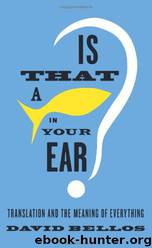Is That a Fish in Your Ear?: Translation and the Meaning of Everything by David Bellos

Author:David Bellos [Bellos, David]
Language: eng
Format: mobi, epub
Tags: Language Arts & Disciplines, Linguistics, Translating & Interpreting
ISBN: 9780865478725
Google: J1WPippqeUsC
Amazon: 0865478570
Publisher: Macmillan
Published: 2011-10-11T00:00:00+00:00
SEVENTEEN
The Third Code: Translation as a Dialect
What language do you speak? That sounds like a merely factual inquiry with an uncomplicated answer, whatever it is. But as I was reading an American newspaper during the financial crisis of 2008, I learned that the U.S. treasury secretary was about to unveil the big megillah to put an end to the tsunami that was rocking Wall Street at the time. What language was that? Well, English—but only sort of. It was also, marginally, in Hebrew (mediated by Yiddish) and in Japanese, too. I can translate it into French—M. Paulson s’apprête à dévoiler la bonne méthode pour calmer la tourmente des marchés—but that doesn’t prove the sentence was in English, only that I understood it. I can back-translate the French sentence in any number of ways—but that would only show that “English” is a far from determinate thing.
Translators working into English are confronted on every page with decisions about the nature, scope, identity, and audience of the language they are writing. I write in a personal idiom that bears traces of my upbringing in England, my long stay in Scotland, and my present life on the East Coast of the United States. When I write a translation, however, I have to make choices in every paragraph about what variety of written English to use. As is well known, spellings, numbering systems, greetings, and curses, as well as several hundred common vocabulary items, have different forms in different parts of the English-speaking world. It drives me mad. How do I know what is “English” and what is something else?
The practical solution is this: I write the way I like, and then a skillful copy editor amends my prose to make it conform to the style appropriate to the output and the target audience of a particular publishing house. But that is only the outward form of the solution. The target audience of most English-language publishing houses, for most of the books they put out, is indeterminately large, and includes American, Australian, Indian, Canadian, and South African readers—each large grouping feeling most at home in significantly different varieties of the spoken and written tongue. So what gets edited out in any of my translations—and in any translated literary or nonfiction work of more than local interest—are those quirks of language that mark it as belonging to any geographical variety of English. In other words, I get de-Britted if I am being edited for U.S. publication and de-Yanked (a less difficult job, since my Americanisms are few and far between) when a London publisher takes the lead. What you get at the end of the process is “English-minus”—ideally, a common center ground of the English language, stripped of vocabulary and turns of phrase that are not understood or understood in different ways in any part of the messy spread of what is still called, for want of a better word, the English tongue.
The language of translations in English is therefore not a representation of a language spoken or written anywhere at all.
Download
Is That a Fish in Your Ear?: Translation and the Meaning of Everything by David Bellos.epub
This site does not store any files on its server. We only index and link to content provided by other sites. Please contact the content providers to delete copyright contents if any and email us, we'll remove relevant links or contents immediately.
| Computer Vision & Pattern Recognition | Expert Systems |
| Intelligence & Semantics | Machine Theory |
| Natural Language Processing | Neural Networks |
Algorithms of the Intelligent Web by Haralambos Marmanis;Dmitry Babenko(17650)
Jquery UI in Action : Master the concepts Of Jquery UI: A Step By Step Approach by ANMOL GOYAL(10070)
Test-Driven Development with Java by Alan Mellor(7755)
Data Augmentation with Python by Duc Haba(7628)
Principles of Data Fabric by Sonia Mezzetta(7403)
Learn Blender Simulations the Right Way by Stephen Pearson(7312)
Microservices with Spring Boot 3 and Spring Cloud by Magnus Larsson(7156)
Hadoop in Practice by Alex Holmes(6704)
RPA Solution Architect's Handbook by Sachin Sahgal(6533)
The Infinite Retina by Robert Scoble Irena Cronin(6241)
Big Data Analysis with Python by Ivan Marin(5959)
Life 3.0: Being Human in the Age of Artificial Intelligence by Tegmark Max(5547)
Pretrain Vision and Large Language Models in Python by Emily Webber(4917)
Infrastructure as Code for Beginners by Russ McKendrick(4677)
Functional Programming in JavaScript by Mantyla Dan(4516)
WordPress Plugin Development Cookbook by Yannick Lefebvre(4413)
The Age of Surveillance Capitalism by Shoshana Zuboff(4275)
Embracing Microservices Design by Ovais Mehboob Ahmed Khan Nabil Siddiqui and Timothy Oleson(4168)
Applied Machine Learning for Healthcare and Life Sciences Using AWS by Ujjwal Ratan(4156)
